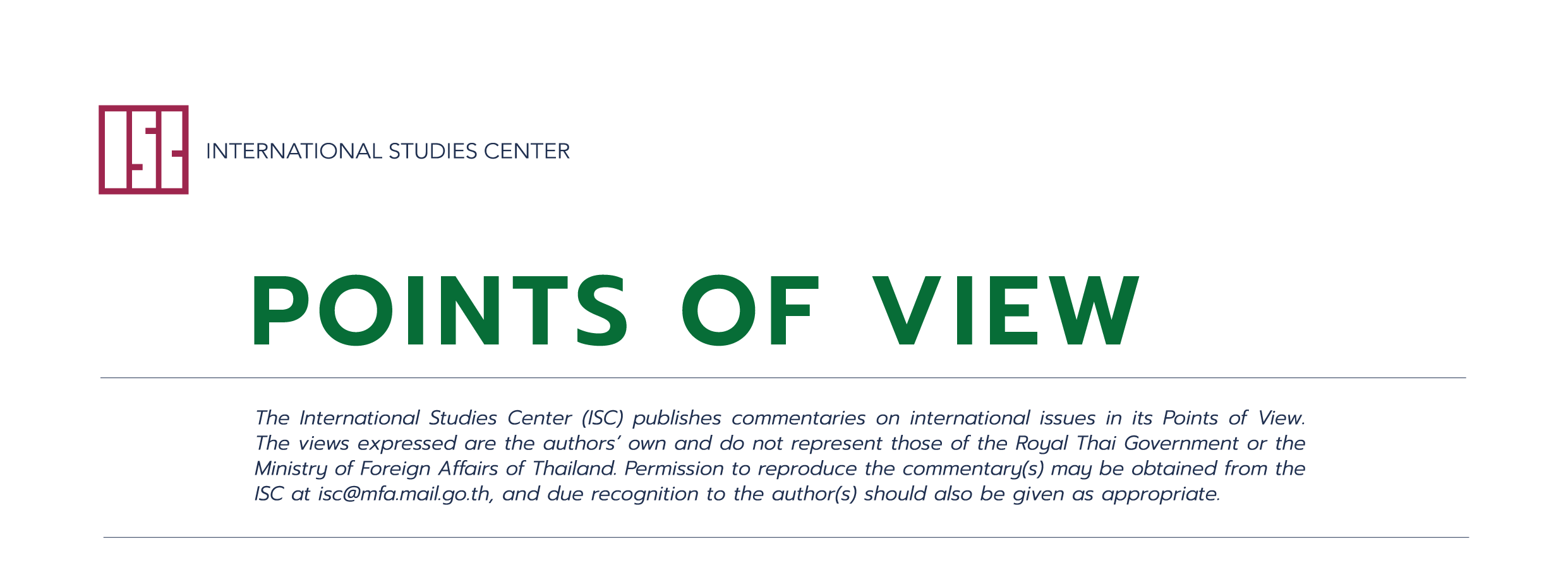New ROK with Active Strategic Approaches | Kavi Chongkittavorn
New ROK with Active Strategic Approaches | Kavi Chongkittavorn
วันที่นำเข้าข้อมูล 4 Aug 2022
วันที่ปรับปรุงข้อมูล 14 Dec 2022
 |
No. 7/2022 | August 2022
New ROK with Active Strategic Approaches
Kavi Chongkittavorn*
(Download .pdf below)
Nearly 100 days in power, it is clear that the new administration President Yoon Suk-yeol will have different ways of engaging allies and friends both near and far. When US President Joe Biden visited South Korea recently, Yoon told his guest that Seoul would come up with its own Indo-Pacific strategic framework that would fit in the region’s ecosecurity system.
Since the Free and Open Indo-Pacific (FOIP) concept was introduced officially in 2017, South Korea has not been making comments about the new initiative which was earlier broached by Japan. The idea was then focusing on strategic areas as Tokyo wanted to maintain the US security presence in this part of the world. Instead, the previous government of former president Moon Jae-in was focusing on promoting the New Southern Policy that would take in ASEAN and India as the main drivers of Korean economy.
However, given the swift strategic shifts in both regional and international landscape during the Trump administration and thereafter, the FOIP has morphed into different frameworks zeroed in on multipurpose cooperation that the region wound find receptive which also includes investment in infrastructure.
In his inaugural speech on May 10, President Yoon Suk-yeol made clear that as the world tenth largest economy, South Korea has to take on a greater global role. “We must actively protect and promote universal values and international norms that are based on freedom and respect for human rights. We must take on an even greater role in expanding freedom and human rights not just for ourselves but also for others. The international community expects us to do so. We must answer that call”. It was a powerful pronouncement from an East Asian country that has gone through a dictatorial path before.
In the past two decades after the Asian economic crisis, South Korea’s economy and political power has grown many folds, quickly overtaking many Western economies. As such, Seoul is no longer contended with its traditional role evolving around the US security alliance and the crisis in Korean Peninsula.
While these prime security topics are still pivotal and continue to be dominant in the country’s foreign policy outlook, Seoul would like to expand its international profile that would commensurate with its economic power. Under Yoon, South Korea perceives itself as “Global Pivotal State or GPS”, which would enable the country to engage in practical strategic cooperation in transnational issues involving economic, maritime, climate change, cyber security, public health and energy security.
With the rising influence of K-culture, a brand name for anything related to Korea i.e. film, food, music, cosmetic, fashion, etc., the Moon administration can take the advantage of this popularity and transform this positive vibe into strategic assets that would augment Korean diplomatic weigh in the world.
Kudos must also went to Yoon’s predecessor, Moon Jae-in, for breaking the diplomatic ice-cap of Korea. The former president successfully imbedded Korea in ASEAN and Mekong subregion. During the two-year pandemic crisis, while other countries have witnessed some lapses, Korea has been pushing up front for more cooperation with the region with additional assistance funding.
Right after his appointment, Korean Foreign Minister Park Jin told the Seoul-based ASEAN diplomats that ASEAN remains the centered piece of his country’s foreign policy. At the moment, the Yoon administration’s foreign policy team is working on Indo-Pacific strategic framework along with a comprehensive policy towards ASEAN.
Within the region, South Korea is fast catching up with other two Asian economic powers, China and Japan in elevating its profile and cooperative efforts. Under the current ASEAN plus three framework, their joint collaborative efforts are imperative for the region’s speedier economic recovery.
At the moment, ASEAN plus three countries are working on their five-year work plan from 2023-2027. South Korea will be able to play an important role in the areas of political and security, transnational and non-traditional security.
From now on, Seoul will be more strategic in any undertaking with foresight, in particular in the Indo-Pacific that would mean further strengthening its security alliance with the US and other allies. In recent months, Yoon has been engaged great powers’ politics both in Europe and Asia.
Relations with China remains high on the agenda of the Yoon administration. Seoul remains highly cautious in engaging China, mindful of its economic ties and security implications. It is still early to tell how the new Korean administration would respond to the heightening of China-US rivalries.
Regarding the South Korea-Japan relations, there were positive signs that both countries are now ready for rapprochement with joint efforts to find a solution to the long-bitter historical issue related to comfort women. Without this settlement, it is obvious that their bilateral ties would be difficult to ameliorate to the much wanted strategic level.
On regional issues, the Yoon administration would be more forceful, especially those impact on peace and international rules-based order. At the upcoming ASEAN annual meeting in Phnom Penh, South Korea would be able to share their latest assessments in this part of the world, especially the crisis in Myanmar and South China Sea disputes.
In the final analysis, as a global catalyst, the Yoon administration would be more assertive on issues related to norms, democracy and international rule-based governance. It would sooner than later to find out whether Seoul can successfully navigate in the region with multi-complex relations.
[*] Senior Visiting Fellow at Korea National Diplomatic Academy (KNDA)